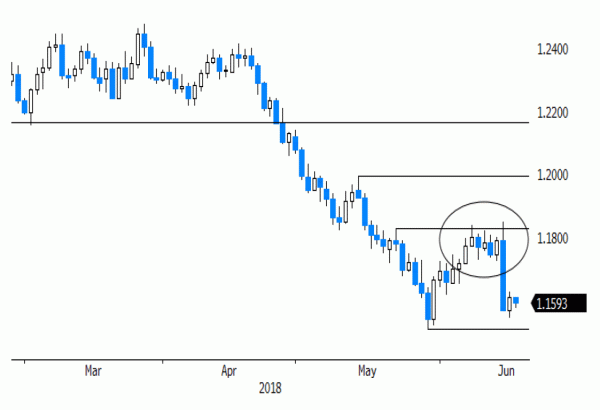Rates: Event risk looms large, supporting core bonds?
The German Bund and US Note future could extend gains at the start of the week as a rift between the CDU and CSU on migration risks overthrowing the government. The US/Chinese trade spat intensified as well. The ECB’s conference in Sintra will draw a lot of attention later this week.
Currencies: Trade tensions and German political risk to weigh on the euro?
The post-ECB decline of the euro slowed down on Friday. There are few eco data today. Trade tensions and political uncertainty in Germany are potential event risks for markets at the start of the new week. Both factors might be intrinsically negative for the euro. A retest of the 1.1510 correction low remains possible.
The Sunrise Headlines
- The US equity markets closed with losses on Friday with no real outliers. The Asian markets continued this market sentiment with opening in red on Monday. The NIKKEI is underperforming by opening with 0.82% lower.
- China will retaliate against the new US tariffs on $50bn in Chinese imports. In response it will impose 25 per cent tariffs on $34bn of US imports targeting agriculture and auto-industry and threatens to add an additional $16bn later.
- Brexit uncertainties, high oil prices and fears of a trade war is causing the UK’s economy to grow this year at its weakest rate since 2009. The BCC revised its growth forecast for 2018 downwards to 1.3% from 1.4%.
- Angela Merkel is facing her interior minister Horst Seehofer in a stand-off over the treatment of asylum seekers. The disagreement is a threat to the current coalition and should in all cases be avoided with the EU-summit of this month.
- Emmanuel Macron and Angela Merkel are meeting this week to discuss the Eurozone budget. France’s finance minister claims solid progress in Franco-German discussions, signalling that a deal this week could be struck.
- This Friday’s OPEC meeting is promising to be a chaotic one. Venezuela and Iraq are about to join Iran in blocking a proposal to increase oil output, that was put on the table by Saudi Arabia and Russia.
- Today’s economic calendar is relatively empty with only speeches colouring the day. Draghi gives the opening speech of ECB’s Forum in Sintra. Atlanta Fed governor Bostic and San Francisco Fed governor Williams are to speak as well.
Currencies: Trade Tensions And German Political Risk To Weigh On The Euro?
Trade and German crisis to weigh on euro?
The decline of EUR/USD calmed down after the euro fell off a cliff as the ECB on Thursday took a much softer approach than the Fed, by cementing rates for more than a year. US eco data were mixed and had only a limited impact on the dollar. The US formally imposed tariffs on $50bn of Chinese imports. The initial market reaction was guarded. USD/JPY held relatively stable and closed the session little changed at 110.66. EUR/USD maintained most of its intraday gain and finished the session at 1.1610.
Chinese markets are closed this morning. Most other regional equities show substantial losses as retaliation from China against the US import tariffs is raising the risk for an outright trade war. USD/JPY dropped temporary to the 110.30 area, but there are no follow-through losses. EUR/USD is losing a few ticks (near 1.1590). Tensions within the German government on migration are a tentative negative for the euro.
The eco calendar is thin today. The market focus might turn to the next developments in the trade war. Until now, the impact of trade tensions on the euro or the dollar was modest. An escalation might hurt Europe/European growth more that the US. However, it is difficult to make a one-to-one link with EUR/USD trading. Political uncertainty in Germany is a potential negative for the euro, too. CB speakers (both from the ECB and the Fed) are a wildcard. However, CB talk will probably confirm policy divergence as it appeared at last week’s Fed and ECB meetings. Going into the ECB meeting, we assumed EUR/USD to stay north of the 1.1510 support as we expected the ECB to herald policy normalisation. However, last week’s ECB decision signalled that the euro won’t get interest rate support soon. We turned again more cautious on the euro. A retest of the EUR/USD 1.1510 support is possible. The dollar can stay strong for longer against the euro. The picture for USD/JPY is more balanced as risk-off sentiment and a high interest rate differential might cancel each other out.
EUR/GBP hovered sideways on Friday, roughly between 0.8720/60. UK retail sales were strong, but the rift on Brexit within the UK government persisted. The Brexit debate returns to the House of Lords today. If the government loses the vote, the Brexit bill will return to the House of Commons as debate on the role of Parliament in Brexit continues. We expect more sideways trading in EUR/GBP in the mid 0.87 area
EUR/USD: euro to stay weak as trade tensions and German political crisis might dominate headlines

